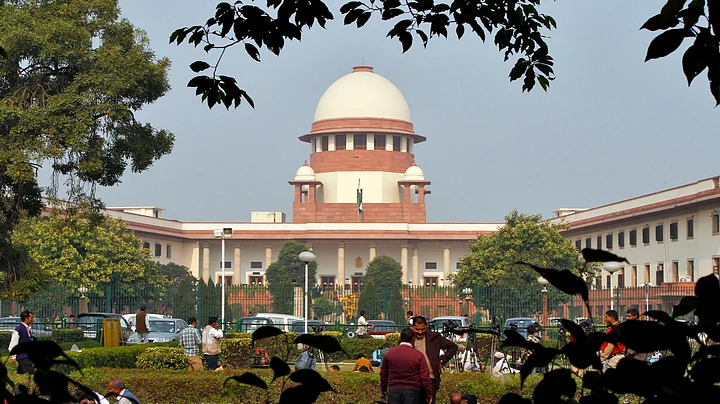As Delhi chokes on post-Diwali pollution, many of us are perplexed by the Supreme Court’s decision to revoke the ban on firecrackers this year and allow restricted use of green crackers within a specified time band for two days.
The order came despite evidence of a significant jump in pollution levels in the National Capital Region every festival season, a pattern that repeated this time too as residents blithely ignored the apex court and burst crackers, green and otherwise, into the early hours of morning for several days before and after Diwali.
Does this blatant defiance of the Supreme Court mean that we as a people no longer care about the sanctity of institutions? Or is non-compliance a consequence of an ivory tower syndrome that prompts courts to shoot off orders that can’t be enforced because of executive reluctance or pure and simple administrative collapse?
These are compelling questions because this is the second time in recent months that an apex court decision has singed Delhi and polarised residents into warring groups, pitting neighbour against neighbour, police against citizens and vice versa.
From Firecrackers to Feral Dogs
Today, the sanatan versus health discourse has divided the city. A few months ago, in August, Delhi was rocked by an ugly fight between dog-lovers and dog-haters following another perplexing order from the Supreme Court to round up Delhi’s estimated 10 lakh stray dogs within eight weeks and put them into shelters which don’t even exist.
Although the order was later modified into a more reasonable plan to manage the Capital’s burgeoning stray dog population, the scars from those traumatic weeks have yet to heal. Delhi was on the edge of a civil war as feeders across the city were physically attacked to prevent them from giving food to dogs they had been looking after for years.
Shockingly, anti-feeder men were so driven by hate and anger that they thought nothing of hitting women and young girls, pulling their hair and even slashing them with knives. Social media was full of horrific pictures of bruised and bloodied women who received no help from an unsympathetic police force.
Meanwhile, dogs were picked up indiscriminately and thrown out into the wilderness despite a second court order urging caution while instructing the Delhi government to prepare a properly thought out road map to tackle the issue.
As the highest court in the land, the Supreme Court is expected to adjudicate on lofty constitutional matters and protect fundamental rights guaranteed to each citizen by the Constitution. Unfortunately, both these recent decisions ended up disrupting the lives of ordinary Delhi folk in grievous ways.
Hasty Decisions, One-Sided Hearings
The manner in which the decisions were taken is worrying. In both cases, the court chose to hear only the government counsel although established jurisprudence allows for opposing views to be considered before a decision is taken.
The first order on removing stray dogs to shelters was issued in less than two weeks, a stunning record by any standard for the fastest disposal of a case. Animal rights activists and dog feeder groups were not given an opportunity to present their arguments on the feasibility of the court-mandated plan or to present an alternative solution.
Similarly, the order allowing the sale and bursting of crackers came in a matter of days. This too seems to have been based solely on positive feedback from the central and Delhi governments and assurances from the manufacturers of so-called green crackers.
Neither health nor pollution experts were invited to present the other side of the picture. It’s worthwhile recalling that the movement to ban firecrackers in the NCR was kicked off by petitions from parents who appealed to the Supreme Court some years ago to protect the fundamental right of their children to breathe clean air.
The response of the Delhi government in both cases has been callous to say the least. The post-Diwali grey smog hanging over the city is visible to the naked eye. Hospitals have reported dozens of cases of patients rushing to emergency wards complaining of respiratory difficulties.
Yet, chief minister Rekha Gupta, her cabinet ministers and BJP leaders scrambled figures to claim only a marginal increase in pollution levels. And although people flagrantly violated the SC’s restrictions, she thanked them for celebrating "responsibly’" in true sanatan tradition. Ironically, in the same breath, she announced plans to shower the city with artificial rain on 29 October to reduce pollution.
Politics Over Policy, Sentiment Over Science
The Delhi government and BJP leaders spread total confusion on the stray dog issue as well. They bandied incredulous figures to claim that hundreds of people were being bitten by stray dogs every day. The range of the numbers being thrown around was stupefying.
The minister for animal husbandry told the Parliament that dog bite cases in Delhi had dropped sharply, from 6,691 in 2024 to 3,196 in 2025 so far. But BJP leaders and a credulous media floated numbers claiming that there were 90,000 bites in the first six months of this year.
It is distressing that a nation that aims to be fully developed or viksit by 2047 seems to lack scientific data and proper mapping. Decision making has become an arbitrary exercise, guided by religious sentiment and/or individual prejudice.
More than anything else, the manner in which Delhi was polarised into belligerent groups at war with each other does not augur well for democracy. The least we as citizens expect is that our courts and government safeguard our right to live in peace and harmony instead of conflict and hate.
(Arati R Jerath is a Delhi-based senior journalist. She tweets @AratiJ. This is an opinion piece, and the views expressed above are the author’s own. The Quint neither endorses nor is responsible for the same.)
